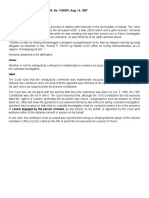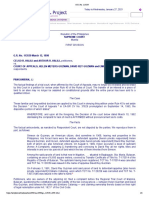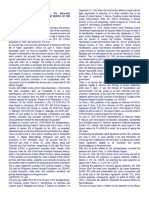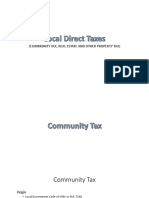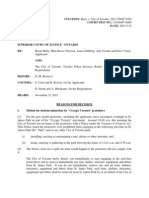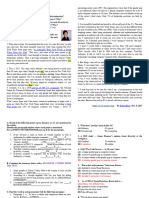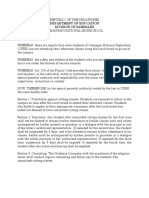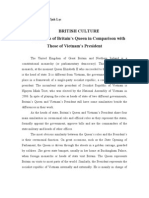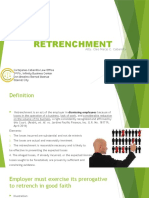0 ratings0% found this document useful (0 votes)
56 viewsDo Not Constitute An Offense. The Fundamental Test
Do Not Constitute An Offense. The Fundamental Test
Uploaded by
inxzThe Supreme Court reversed the Sandiganbayan's dismissal of charges against Hermenegildo Dumlao for his role in a lease-purchase agreement between the GSIS and Emilio La'o. Dumlao, as a member of the GSIS Board of Trustees, was charged with entering into a manifestly disadvantageous contract on behalf of the government, in violation of the Anti-Graft law. The Sandiganbayan had granted Dumlao's motion to dismiss, but the Supreme Court found that the information contained sufficient facts to establish the elements of the crime. Specifically, it alleged Dumlao's position, his involvement in the contract on the government's behalf, and that the
Copyright:
© All Rights Reserved
Available Formats
Download as DOCX, PDF, TXT or read online from Scribd
Do Not Constitute An Offense. The Fundamental Test
Do Not Constitute An Offense. The Fundamental Test
Uploaded by
inxz0 ratings0% found this document useful (0 votes)
56 views2 pagesThe Supreme Court reversed the Sandiganbayan's dismissal of charges against Hermenegildo Dumlao for his role in a lease-purchase agreement between the GSIS and Emilio La'o. Dumlao, as a member of the GSIS Board of Trustees, was charged with entering into a manifestly disadvantageous contract on behalf of the government, in violation of the Anti-Graft law. The Sandiganbayan had granted Dumlao's motion to dismiss, but the Supreme Court found that the information contained sufficient facts to establish the elements of the crime. Specifically, it alleged Dumlao's position, his involvement in the contract on the government's behalf, and that the
Original Title
62 - PEOPLE VS DUMLAO
Copyright
© © All Rights Reserved
Available Formats
DOCX, PDF, TXT or read online from Scribd
Share this document
Did you find this document useful?
Is this content inappropriate?
The Supreme Court reversed the Sandiganbayan's dismissal of charges against Hermenegildo Dumlao for his role in a lease-purchase agreement between the GSIS and Emilio La'o. Dumlao, as a member of the GSIS Board of Trustees, was charged with entering into a manifestly disadvantageous contract on behalf of the government, in violation of the Anti-Graft law. The Sandiganbayan had granted Dumlao's motion to dismiss, but the Supreme Court found that the information contained sufficient facts to establish the elements of the crime. Specifically, it alleged Dumlao's position, his involvement in the contract on the government's behalf, and that the
Copyright:
© All Rights Reserved
Available Formats
Download as DOCX, PDF, TXT or read online from Scribd
Download as docx, pdf, or txt
0 ratings0% found this document useful (0 votes)
56 views2 pagesDo Not Constitute An Offense. The Fundamental Test
Do Not Constitute An Offense. The Fundamental Test
Uploaded by
inxzThe Supreme Court reversed the Sandiganbayan's dismissal of charges against Hermenegildo Dumlao for his role in a lease-purchase agreement between the GSIS and Emilio La'o. Dumlao, as a member of the GSIS Board of Trustees, was charged with entering into a manifestly disadvantageous contract on behalf of the government, in violation of the Anti-Graft law. The Sandiganbayan had granted Dumlao's motion to dismiss, but the Supreme Court found that the information contained sufficient facts to establish the elements of the crime. Specifically, it alleged Dumlao's position, his involvement in the contract on the government's behalf, and that the
Copyright:
© All Rights Reserved
Available Formats
Download as DOCX, PDF, TXT or read online from Scribd
Download as docx, pdf, or txt
You are on page 1of 2
PEOPLE OF THE PHILIPPINES, petitioner, vs.
the signatures of Fabian Ver, Roman Cruz, Aber
HERMENEGILDO DUMLAO y CASTILIANO and Canlas and Jacobo Clave did not appear in the
EMILIO LA’O y GONZALES, respondents. minutes of the meeting held on 23 April 1982, he
said it was safe to conclude that these people did
not participate in the alleged approval of the Lease-
FACTS: The accused Hermenegildo C. Dumlao, Purchase Agreement. This being the case, he
Aber Canlas, Jacobo C. Clave, Roman A. Cruz, Jr., maintained that there was no quorum of the board
and Fabian C. Ver, members of the Board of to approve the supposed resolution authorizing the
Trustees of the Government Service Insurance sale of the GSIS property. There being no approval
System (GSIS) which is a government corporation, by the majority of the Board of Trustees, there can
while in the performance of their official functions be no resolution approving the Lease-Purchase
entered into a contract of lease-purchase with Agreement. The unapproved resolution, he added,
Emilio G. La’o, a private person whereby the GSIS proved his innocence. He further contended that
agreed to sell to said Emilio G. La’o, a GSIS the person to be charged should be Atty. Luis
acquired property consisting of three parcels of Javellana, who sold the subject property to
land with an area of 821 square meters together respondent La’o without the proper authority. He
with a 5-storey building situated at 1203 A. Mabini likewise wondered why he alone was charged
St., Ermita, Manila, known as the Government without including the other two signatories in the
Counsel Centre for the sum of P2,000,000.00 with minutes of the meeting held.
a down payment of P200,000.00 with the balance
payable in fifteen years at 12% interest per annum ISSUE: Whether or not Dumlao’s Motion to
compounded yearly, with a yearly amortization of Dismiss/Quash on the ground that the facts
P264,278.37 including principal and interest charged do not constitute an offense should be
granting Emilio G. La’o the right to sub-lease the granted.
ground floor for his own account during the period
of lease, from which he collected yearly rentals in HELD: No. The resolution of the Sandiganbayan in
excess of the yearly amortization which contract is granting the Motion to Dismiss/Quash of
manifestly and grossly disadvantageous to the respondent Hermenegildo C. Dumlao, is hereby
government. reversed and set aside. The Sandiganbayan is
forthwith directed to set the case for the reception
An Amended Information was filed before the of evidence for the prosecution.
Sandiganbayan charging respondents Dumlao and
La’o, Aber P. Canlas, Jacobo C. Clave, Roman A. The ground raised by respondent Dumlao in his
Cruz, Jr. and Fabian C. Ver with violation of Section Motion to Quash/Dismiss is that the facts charged
3(g) of Republic Act No. 3019, as amended, do not constitute an offense. The fundamental test
otherwise known as the Anti-Graft and Corrupt in determining the sufficiency of the material
Practices Act. When arraigned respondent Dumlao, averments of an information is whether the facts
with the assistance of counsel de parte, pleaded alleged therein, which are hypothetically admitted,
“not guilty” to the offense charged. As agreed upon would establish the essentials elements of the
by the prosecution and respondent Dumlao, a Joint crime defined by law. Evidence aliunde, or matters
Stipulation of Facts and Admission of Exhibits was extrinsic of the Information, are not be considered.
submitted to the court and on the basis thereof, the The elements of the crime under Section 3(g) of
court issued the Pre-Trial Order. Republic Act No. 3019 are as follows: (1) that the
accused is a public officer; (2) that he entered into
Respondent Dumlao filed a Motion to a contract or transaction on behalf of the
Dismiss/Quash on the ground that the facts government; and (3) that such contract or
charged do not constitute an offense. He stated transaction is grossly and manifestly
that the prosecution’s main thrust against him was disadvantageous to the government. After
the alleged approval by the Government Service examining the information, we find that the facts
Insurance System (GSIS) Board of Trustees — of alleged therein, if hypothetically admitted, will prove
which he was a member — of the Lease- Purchase all the elements of Section 3(g) as against
Agreement entered into by and among the GSIS, respondent Dumlao.
the Office of the Government Corporate Counsel
(OGCC) and respondent La’o. He argued that the It can be gathered from the resolution of the
allegedly approved Board Resolution was not in Sandiganbayan that it did consider the ground
fact approved by the GSIS Board of Trustees, invoked by Dumlao (that the facts charged do not
contrary to the allegations in the information. Since constitute an offense); otherwise, it could have
denied respondent Dumlao’s motion. From the
reasoning given by the Sandiganbayan, it is clear
that it dismissed the case because of insufficiency
of evidence. Insufficiency of evidence is not one of
the grounds of a Motion to Quash. The grounds, as
enumerated in Section 3, Rule 117 of the Revised
Rules of Criminal Procedure, are as follows: (a)
That the facts charged do not constitute an offense;
(b) That the court trying the case has no jurisdiction
over the offense charged; (c) That the court trying
the case has no jurisdiction over the person of the
accused; (d) That the officer who filed the
information had no authority to do so; (e) That it
does not conform substantially to the prescribed
form; (f) That more than one offense is charged
except when a single punishment for various
offenses is prescribed by law; (g) That the criminal
action or liability has been extinguished; (h) That it
contains averments which, if true, would constitute
a legal excuse or justification; and (i) That the
accused has been previously convicted or acquitted
of the offense charged, or the case against him was
dismissed or otherwise terminated without his
express consent. Insufficiency of evidence is a
ground for dismissal of an action only after the
prosecution rests its case.
You might also like
- Qualifying Exam Reviewer With Answers New Update 11Document96 pagesQualifying Exam Reviewer With Answers New Update 11Danica Catanduanes100% (2)
- How Democratic Is The American Constitution by Robert A. DahlDocument7 pagesHow Democratic Is The American Constitution by Robert A. Dahlbrucewphillips0% (1)
- People Vs Sandiganbayan CrimproDocument1 pagePeople Vs Sandiganbayan CrimproCarl MontemayorNo ratings yet
- People Vs BinamiraDocument8 pagesPeople Vs BinamiraFncsixteen UstNo ratings yet
- 2nd Quarter Exam Community Engagement Solidarity and Citizenship 12Document2 pages2nd Quarter Exam Community Engagement Solidarity and Citizenship 12Russiel Dagohoy100% (4)
- People v. Dumlao DigestDocument1 pagePeople v. Dumlao DigestbillietotNo ratings yet
- People of The Philippines v. Hermenegildo Dumlao y CastilianoDocument7 pagesPeople of The Philippines v. Hermenegildo Dumlao y CastilianobearzhugNo ratings yet
- Henry T. Go Vs The Fifth Division, SandiganbayanDocument3 pagesHenry T. Go Vs The Fifth Division, Sandiganbayanpatricia.aniyaNo ratings yet
- People Vs Dumlao and Lao MLWDocument5 pagesPeople Vs Dumlao and Lao MLWAMFVZNo ratings yet
- Halili V CADocument6 pagesHalili V CAJade Palace TribezNo ratings yet
- 8 People v. Dumlao GrimaresDocument1 page8 People v. Dumlao GrimaresNica Cielo B. LibunaoNo ratings yet
- Class Digests For StatconDocument5 pagesClass Digests For StatconLeo Cruz100% (1)
- The Prosecution's "Motion FOR Reconsideration" Dated September 5, 2017 IDocument7 pagesThe Prosecution's "Motion FOR Reconsideration" Dated September 5, 2017 Ialex dyNo ratings yet
- G.R. No. 168539Document1 pageG.R. No. 168539wex smithNo ratings yet
- People v. Dumlao DigestDocument1 pagePeople v. Dumlao DigestimXinYNo ratings yet
- 3.4 Halili v. Court of Appeals G.R. No. 113539, March 12, 1998.Document6 pages3.4 Halili v. Court of Appeals G.R. No. 113539, March 12, 1998.Ian Kenneth MangkitNo ratings yet
- Halili Vs CA - 113539 - March 12, 1998 - JDocument7 pagesHalili Vs CA - 113539 - March 12, 1998 - JkimuchosNo ratings yet
- 1st SetDocument17 pages1st SetJeff MadridNo ratings yet
- En Banc G.R. No. 168539, March 25, 2014 PEOPLE OF THE PHILIPPINES, Petitioner, v. HENRY T. GO, Respondent. Decision Peralta, J.Document5 pagesEn Banc G.R. No. 168539, March 25, 2014 PEOPLE OF THE PHILIPPINES, Petitioner, v. HENRY T. GO, Respondent. Decision Peralta, J.RLO1No ratings yet
- 007 People vs. GoDocument9 pages007 People vs. Gost3ll4_my8No ratings yet
- YamanohaDocument18 pagesYamanohaNicoleNo ratings yet
- Zuniga Santos V Santos GranDocument6 pagesZuniga Santos V Santos GranAnakataNo ratings yet
- 07 - Russel v. VestilDocument5 pages07 - Russel v. VestilClark Edward Runes UyticoNo ratings yet
- Marcos VS SandiganbayanDocument15 pagesMarcos VS Sandiganbayanmaria lourdes lopenaNo ratings yet
- PP vs. Henry GoDocument12 pagesPP vs. Henry GoPeterD'Rock WithJason D'ArgonautNo ratings yet
- Celso Halili and Arthur Halili Vs CA (GR No. 113539 March 12, 1998)Document6 pagesCelso Halili and Arthur Halili Vs CA (GR No. 113539 March 12, 1998)strgrlNo ratings yet
- Conflict of Laws Batch 2Document63 pagesConflict of Laws Batch 2LDNo ratings yet
- United States Court of Appeals, Tenth CircuitDocument9 pagesUnited States Court of Appeals, Tenth CircuitScribd Government DocsNo ratings yet
- 006.2 Go vs. SandiganbayanDocument3 pages006.2 Go vs. Sandiganbayanst3ll4_my8No ratings yet
- The Case Issues: The Land Is UrbanDocument3 pagesThe Case Issues: The Land Is UrbanMarian's PreloveNo ratings yet
- Land, Titles and Deeds 20140907Document309 pagesLand, Titles and Deeds 20140907Lalisse Moraga0% (1)
- People vs. DumlaoDocument10 pagesPeople vs. DumlaoZazaNo ratings yet
- Bautista Vs Gonzales. (Ethics) DocDocument3 pagesBautista Vs Gonzales. (Ethics) DocKim SalazarNo ratings yet
- Sps. Virgilio G. Tamayo, Et Al. vs. Heirs of Gavino DominguezDocument5 pagesSps. Virgilio G. Tamayo, Et Al. vs. Heirs of Gavino DominguezjafernandNo ratings yet
- REM LAW - G (1) Venus Vs DesiertoDocument4 pagesREM LAW - G (1) Venus Vs Desiertoirresponsible27No ratings yet
- Goodland Company, Inc., Petitioner, vs. Abraham Co and Christine Chan, Respondents.Document12 pagesGoodland Company, Inc., Petitioner, vs. Abraham Co and Christine Chan, Respondents.Szilveszter FejesNo ratings yet
- United States v. Salvatore Granello, A/K/A Sally Burns, 403 F.2d 337, 2d Cir. (1969)Document4 pagesUnited States v. Salvatore Granello, A/K/A Sally Burns, 403 F.2d 337, 2d Cir. (1969)Scribd Government DocsNo ratings yet
- Published United States Court of Appeals For The Fourth CircuitDocument13 pagesPublished United States Court of Appeals For The Fourth CircuitScribd Government DocsNo ratings yet
- Cases DigestsDocument23 pagesCases Digestsxty517No ratings yet
- PCGG Vs Gutierrez Case DigestDocument4 pagesPCGG Vs Gutierrez Case DigestNor Mangontawar100% (1)
- United States v. Irving Deutsch, Jerome Deutsch, 243 F.2d 435, 3rd Cir. (1957)Document4 pagesUnited States v. Irving Deutsch, Jerome Deutsch, 243 F.2d 435, 3rd Cir. (1957)Scribd Government DocsNo ratings yet
- PBCom v. Go, 642 SCRA 693, G.R. No. 175514 February 14, 2011Document4 pagesPBCom v. Go, 642 SCRA 693, G.R. No. 175514 February 14, 2011Caleb Josh PacanaNo ratings yet
- R.A. 3019 (Anti-Graft and Corrupt Practices Act)Document5 pagesR.A. 3019 (Anti-Graft and Corrupt Practices Act)PaulNo ratings yet
- People Vs Henry T GoDocument8 pagesPeople Vs Henry T GoNath Antonio100% (1)
- Halili Vs CA 1998Document7 pagesHalili Vs CA 1998Atty Ed Gibson BelarminoNo ratings yet
- Atillo III vs. Court of Appeals 266 SCRA 596, January 23, 1997Document12 pagesAtillo III vs. Court of Appeals 266 SCRA 596, January 23, 1997Nikki Estores GonzalesNo ratings yet
- Gr96080 Paderanga Vs DrilonDocument4 pagesGr96080 Paderanga Vs DrilonnikkaremullaNo ratings yet
- 9 Doles VS AngelesDocument7 pages9 Doles VS AngelesEisley SarzadillaNo ratings yet
- 016-Francisco vs. Mejia G.R. No. 141617 August 14, 2001Document9 pages016-Francisco vs. Mejia G.R. No. 141617 August 14, 2001wewNo ratings yet
- Rule 6 - Kinds of PleadingsDocument71 pagesRule 6 - Kinds of PleadingsMaria Divina Gracia D. MagtotoNo ratings yet
- G.R. No. 168539 March 25, 2014 People of The Philippines, Petitioner, HENRY T. GO, RespondentDocument3 pagesG.R. No. 168539 March 25, 2014 People of The Philippines, Petitioner, HENRY T. GO, RespondentJosef MacanasNo ratings yet
- United States v. Angelo v. Graci, 504 F.2d 411, 3rd Cir. (1974)Document6 pagesUnited States v. Angelo v. Graci, 504 F.2d 411, 3rd Cir. (1974)Scribd Government DocsNo ratings yet
- Philippines vs. Ellizabeth Ganguso y Decena (G.R. No. 115430Document4 pagesPhilippines vs. Ellizabeth Ganguso y Decena (G.R. No. 115430LoveAnneNo ratings yet
- United States v. Graham, 146 F.3d 6, 1st Cir. (1998)Document8 pagesUnited States v. Graham, 146 F.3d 6, 1st Cir. (1998)Scribd Government DocsNo ratings yet
- Alba Vs de La CruzDocument3 pagesAlba Vs de La CruzPatrick RamosNo ratings yet
- G.R. No. 168539 March 25, 2014 People OF THE PHILIPPINES, Petitioner, HENRY T. GO, RespondentDocument7 pagesG.R. No. 168539 March 25, 2014 People OF THE PHILIPPINES, Petitioner, HENRY T. GO, RespondentAngelNo ratings yet
- Peo v. SandiganbayanDocument5 pagesPeo v. SandiganbayanbrownboomerangNo ratings yet
- Vargas v. Atty. Ignes, Atty. Mann, Atty. Viajar and Atty. Nadua A.C. No. 8096 July 5, 2010Document10 pagesVargas v. Atty. Ignes, Atty. Mann, Atty. Viajar and Atty. Nadua A.C. No. 8096 July 5, 2010Rose Ann Furio100% (1)
- BECABELSDocument9 pagesBECABELSjannagotgoodNo ratings yet
- U.S. v. Sun Myung Moon 532 F.Supp. 1360 (1982)From EverandU.S. v. Sun Myung Moon 532 F.Supp. 1360 (1982)No ratings yet
- U.S. v. Sun Myung Moon 718 F.2d 1210 (1983)From EverandU.S. v. Sun Myung Moon 718 F.2d 1210 (1983)No ratings yet
- People of The Philippines, Plaintiff-Appellee, vs. ARTURO LARA y ORBISTA, Accused-Appellant. FACTS: The Prosecution Presented ThreeDocument2 pagesPeople of The Philippines, Plaintiff-Appellee, vs. ARTURO LARA y ORBISTA, Accused-Appellant. FACTS: The Prosecution Presented ThreeinxzNo ratings yet
- Crim Pro Leviste V CADocument2 pagesCrim Pro Leviste V CAinxzNo ratings yet
- Crim Pro UniliverDocument2 pagesCrim Pro UniliverinxzNo ratings yet
- Crim Pro Luz V PeopleDocument6 pagesCrim Pro Luz V PeopleinxzNo ratings yet
- 66 - People VS de LeonDocument2 pages66 - People VS de LeoninxzNo ratings yet
- Crim 2 Digest People V AdlawanDocument1 pageCrim 2 Digest People V AdlawaninxzNo ratings yet
- Crim Pro Digest Lacson V Executive Secretary 301 SCRADocument2 pagesCrim Pro Digest Lacson V Executive Secretary 301 SCRAinxz100% (1)
- Crim Pro Digest Jimenez V Sorongon 687 SCRA 151Document2 pagesCrim Pro Digest Jimenez V Sorongon 687 SCRA 151inxzNo ratings yet
- Crim Pro Digest Matrido V People GR No. 179061 July 13, 2009Document1 pageCrim Pro Digest Matrido V People GR No. 179061 July 13, 2009inxzNo ratings yet
- 58 - ABSCBN Vs GozonDocument2 pages58 - ABSCBN Vs GozoninxzNo ratings yet
- Dela Cerna Vs PototDocument1 pageDela Cerna Vs PototinxzNo ratings yet
- 54 - People Vs EstomacaDocument2 pages54 - People Vs EstomacainxzNo ratings yet
- Community Tax, Real Estate and Other Property TaxDocument47 pagesCommunity Tax, Real Estate and Other Property TaxPUNK BEARNo ratings yet
- Fundamental Rights (Article 12 To 35) - PSC ExpertttDocument4 pagesFundamental Rights (Article 12 To 35) - PSC Expertttamalsuresh1503No ratings yet
- HSY2601 - Assignment 02Document6 pagesHSY2601 - Assignment 02Nhlakana Kay KhwelaNo ratings yet
- Van Niekerk 2012 Constitutional Protection of Common Law The Endurance of The Civilian Tradition in Southern AfricaDocument20 pagesVan Niekerk 2012 Constitutional Protection of Common Law The Endurance of The Civilian Tradition in Southern Africalynsay.joubertNo ratings yet
- The Greek Debt CrisisDocument14 pagesThe Greek Debt CrisisTimothy Tan100% (2)
- Batty V City Toronto Interim Stay Nov1511Document7 pagesBatty V City Toronto Interim Stay Nov1511TorontoistNo ratings yet
- Unit 1 Class 5 - Reading Practice Gender Discrimination (1) ANSWERSDocument3 pagesUnit 1 Class 5 - Reading Practice Gender Discrimination (1) ANSWERSPame Pérez VegaNo ratings yet
- 16 Padilla V AirborneDocument2 pages16 Padilla V AirborneJug HeadNo ratings yet
- Final Counter Affidavit Criminal CaseDocument3 pagesFinal Counter Affidavit Criminal CaseRod Rafael De LeonNo ratings yet
- Department of Education Division of ZambalesDocument2 pagesDepartment of Education Division of ZambalesgerrymanderingNo ratings yet
- ComparisonDocument3 pagesComparisonLac NicoNo ratings yet
- Pablito V. Sanidad vs. The Commission On Elections: FactsDocument4 pagesPablito V. Sanidad vs. The Commission On Elections: FactsKate Shine MalinaoNo ratings yet
- People Vs JohnsonDocument3 pagesPeople Vs JohnsonJazem AnsamaNo ratings yet
- Module10 No Answer KeyDocument15 pagesModule10 No Answer KeyMaetherese SaradponNo ratings yet
- Activity: 4 Pics 1 WordDocument8 pagesActivity: 4 Pics 1 WordDip PerNo ratings yet
- KMU Vs Garcia Case DigestDocument1 pageKMU Vs Garcia Case DigestDayday Able0% (1)
- Lecture 2 DefinitionDocument20 pagesLecture 2 DefinitionDeeNoor Pengiran TejuddinNo ratings yet
- Historical School of Jurisprudence 3Document7 pagesHistorical School of Jurisprudence 3mohankumarNo ratings yet
- Leslie Espino Vs NLRCDocument8 pagesLeslie Espino Vs NLRCMarvin MagaipoNo ratings yet
- Onimisi's Care, Volume 2.1.Document275 pagesOnimisi's Care, Volume 2.1.nlawan984No ratings yet
- Complaint and Jury Demand 01.17.19Document31 pagesComplaint and Jury Demand 01.17.19Anonymous GF8PPILW5No ratings yet
- CVC Act 2013Document14 pagesCVC Act 2013Veda PrakashNo ratings yet
- SSS EA vs. CADocument6 pagesSSS EA vs. CAMaria Fiona Duran MerquitaNo ratings yet
- Enhancing Market-Oriented Urban Agriculture in The Gaza Strip: Networking For Policy Change and ResilienceDocument9 pagesEnhancing Market-Oriented Urban Agriculture in The Gaza Strip: Networking For Policy Change and ResilienceOxfamNo ratings yet
- Retrenchment: Cartajenas-Cabanilla Law Office 3 FLR, Infinity Business Center Don Anselmo Bernad Avenue Ozamiz CityDocument12 pagesRetrenchment: Cartajenas-Cabanilla Law Office 3 FLR, Infinity Business Center Don Anselmo Bernad Avenue Ozamiz CityCleo Marjo B. CartajenasNo ratings yet
- Taxation Full CaseDocument163 pagesTaxation Full CaseJacquelyn AlegriaNo ratings yet



